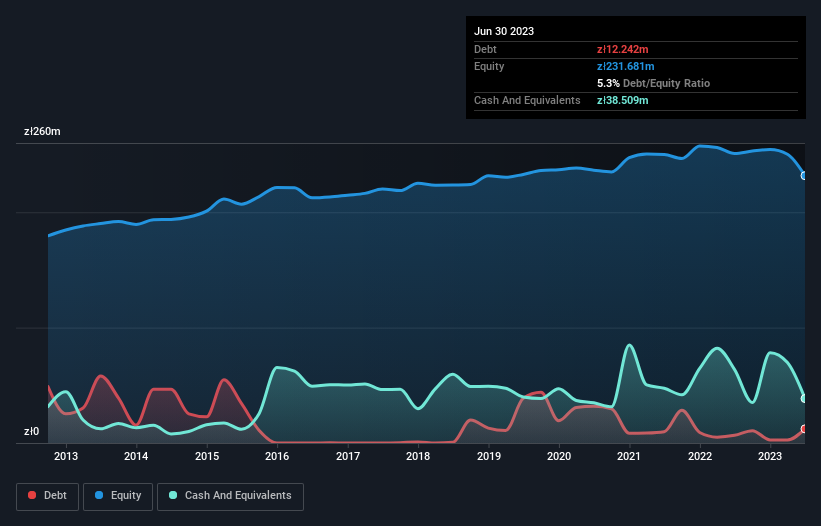Legendary fund manager Li Lu (who Charlie Munger backed) once said, 'The biggest investment risk is not the volatility of prices, but whether you will suffer a permanent loss of capital.' So it might be obvious that you need to consider debt, when you think about how risky any given stock is, because too much debt can sink a company. We can see that Wasko S.A. (WSE:WAS) does use debt in its business. But the more important question is: how much risk is that debt creating?
When Is Debt Dangerous?
Debt assists a business until the business has trouble paying it off, either with new capital or with free cash flow. In the worst case scenario, a company can go bankrupt if it cannot pay its creditors. However, a more common (but still painful) scenario is that it has to raise new equity capital at a low price, thus permanently diluting shareholders. By replacing dilution, though, debt can be an extremely good tool for businesses that need capital to invest in growth at high rates of return. When we think about a company's use of debt, we first look at cash and debt together.
See our latest analysis for Wasko
How Much Debt Does Wasko Carry?
The image below, which you can click on for greater detail, shows that at June 2023 Wasko had debt of zł12.2m, up from zł6.65m in one year. However, its balance sheet shows it holds zł38.5m in cash, so it actually has zł26.3m net cash.

How Healthy Is Wasko's Balance Sheet?
According to the last reported balance sheet, Wasko had liabilities of zł144.3m due within 12 months, and liabilities of zł45.7m due beyond 12 months. On the other hand, it had cash of zł38.5m and zł177.4m worth of receivables due within a year. So it actually has zł25.9m more liquid assets than total liabilities.
It's good to see that Wasko has plenty of liquidity on its balance sheet, suggesting conservative management of liabilities. Because it has plenty of assets, it is unlikely to have trouble with its lenders. Succinctly put, Wasko boasts net cash, so it's fair to say it does not have a heavy debt load! The balance sheet is clearly the area to focus on when you are analysing debt. But it is Wasko's earnings that will influence how the balance sheet holds up in the future. So if you're keen to discover more about its earnings, it might be worth checking out this graph of its long term earnings trend.
Over 12 months, Wasko made a loss at the EBIT level, and saw its revenue drop to zł520m, which is a fall of 3.6%. We would much prefer see growth.
So How Risky Is Wasko?
We have no doubt that loss making companies are, in general, riskier than profitable ones. And in the last year Wasko had an earnings before interest and tax (EBIT) loss, truth be told. Indeed, in that time it burnt through zł14m of cash and made a loss of zł13m. With only zł26.3m on the balance sheet, it would appear that its going to need to raise capital again soon. Overall, its balance sheet doesn't seem overly risky, at the moment, but we're always cautious until we see the positive free cash flow. The balance sheet is clearly the area to focus on when you are analysing debt. But ultimately, every company can contain risks that exist outside of the balance sheet. For instance, we've identified 2 warning signs for Wasko (1 doesn't sit too well with us) you should be aware of.
When all is said and done, sometimes its easier to focus on companies that don't even need debt. Readers can access a list of growth stocks with zero net debt 100% free, right now.
Valuation is complex, but we're here to simplify it.
Discover if Wasko might be undervalued or overvalued with our detailed analysis, featuring fair value estimates, potential risks, dividends, insider trades, and its financial condition.
Access Free AnalysisHave feedback on this article? Concerned about the content? Get in touch with us directly. Alternatively, email editorial-team (at) simplywallst.com.
This article by Simply Wall St is general in nature. We provide commentary based on historical data and analyst forecasts only using an unbiased methodology and our articles are not intended to be financial advice. It does not constitute a recommendation to buy or sell any stock, and does not take account of your objectives, or your financial situation. We aim to bring you long-term focused analysis driven by fundamental data. Note that our analysis may not factor in the latest price-sensitive company announcements or qualitative material. Simply Wall St has no position in any stocks mentioned.
About WSE:WAS
Wasko
Designs, implements, and integrats software, information systems, and advanced industrial automation.
Flawless balance sheet and good value.
Market Insights
Community Narratives



